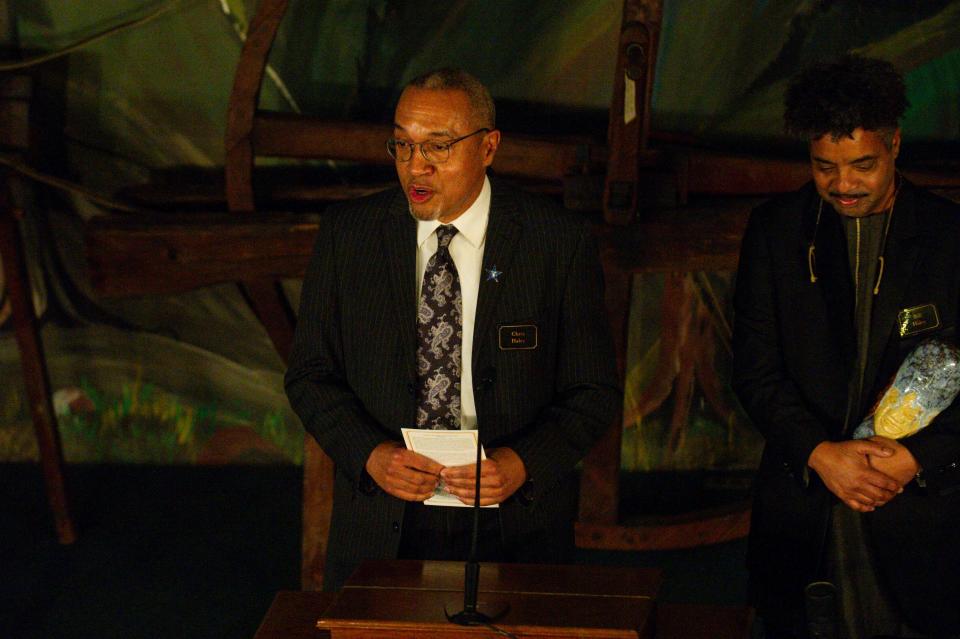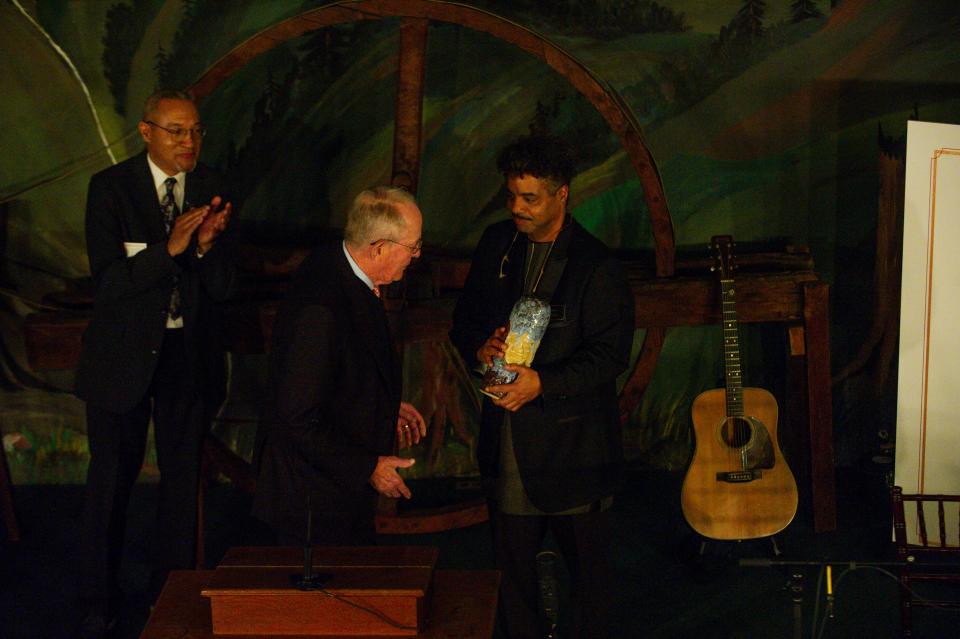Museum of Appalachia honors 'Roots' author Alex Haley: 'He was God's storyteller'
- Oops!Something went wrong.Please try again later.
- Oops!Something went wrong.Please try again later.
- Oops!Something went wrong.Please try again later.
- Oops!Something went wrong.Please try again later.
"Find the good and praise it," the best-known saying attributed to world-renowned author Alex Haley, was the theme of the night at the Museum of Appalachia's Heroes of Southern Appalachia Award ceremony.
Haley's friend Lamar Alexander, former Tennessee governor, U.S. senator and education secretary, presented the award to the late author's grandson Bill Haley and nephew Chris Haley March 1 in a moving ceremony that paid homage to Alex Haley's contributions across the Appalachian region.

"We celebrate Alex Haley because he was God’s storyteller,” Alexander said. "At the peak of his career, when he was perhaps the world’s best-known writer, he sunk his roots into East Tennessee and reminded us to 'Find the good and praise it.'"
Known best for his 1976 Pulitzer Prize-winning masterpiece - coming up on its 50th anniversary since its release - "Roots: The Saga of an American Family," Alex Haley's literary legacy left a mark on American culture. The novel's astounding success, with more than 15 million copies sold in just seven months, was paralleled by its television adaptation, which captivated a record-breaking 130 million viewers. Haley's groundbreaking work not only ignited a nationwide fascination with genealogy but also fostered a deep appreciation for African American history.
In his later years, the acclaimed author made East Tennessee his home. In 1986, then-Gov. Alexander facilitated a meeting between Haley and John Rice Irwin, the late founder of the Museum of Appalachia, following a visit to the museum. Haley was so enamored that he chose to settle nearby, purchasing a farm from Irwin. That historic farmstead is now owned by the Children’s Defense Fund, marking a legacy of literary and cultural significance in the region. Irwin died in January 2022.
Bill Haley told of the impact his grandfather continues to have across the world more than 30 years after his death is dear to his heart, not just because Alex Haley was such a revered author and historian, but because he was such a great friend.

"Whether it's globally or in the Appalachian community, sometimes as family members we don't realize just how significant he was to the world 30 years after his passing, and it's just amazing. He was a very busy man who was on the road 255 days out of the year, so it's great to continue to hear how much he has impacted people's lives," Bill Haley said.
The second oldest of Alex Haley's four living grandchildren, Bill Haley was 28 when the author died. He continues to carry on the family's name by treasuring the legacy of his grandfather, whom he fondly remembers.
"We didn't get to see him all the time because he was so busy and traveling the world, so I treasured all of the moments growing up that he was around me," Bill Haley said. "He impacted so many people on a personal level, and to continue to hear these stories from people here in East Tennessee is an honor. His gift to the world was so much more than his work, but his friendship to so many people."
Bill Haley said his grandfather never felt more at home than he did in East Tennessee. "He could have called anywhere in the world home, but the place he loved and felt comfortable the most was right here up the street from the Museum of Appalachia."

Gary R. Wade, retired Tennessee Supreme Court Chief justice and Museum of Appalachia board chairperson, lauded Alex Haley as a deserving recipient of this year's Heroes of Appalachia Award. Wade praised Haley's profound contributions to both African American and Southern Appalachian cultures, and noted his efforts to highlight their shared heritage.
"He found that these cultures are a lot more alike than they are different. It is in the spirit of his motto, 'Find the good and praise it,' that we honor him with this award," said Wade.
At the time of his death in 1992, Haley was crafting a novel centered in Southern Appalachia, featuring a character inspired by Steve Parkey, an African American blacksmith from Hancock County. Parkey's historic shop is prominently displayed on the museum grounds, signaling Haley's commitment to reshaping the perception of mountain communities.
In an interview in the Journal: Appalachia six months prior to his death, Haley expressed frustration with the misrepresentation of Appalachia in popular media, highlighting the region's rich heritage and vibrant lifestyle, which he sought to portray authentically in his work. Through the book, Haley sought to reshape the image of the mountain people that he had come to know.
Angela Dennis is the Knox News race, justice and equity reporter. Email angela.dennis@knoxnews.com. X formerly called Twitter @AngeladWrites. Instagram @angeladenniswrites. Facebook at Angela Dennis Journalist. The Oak Ridger's News Editor Donna Smith contributed to the story.
Read exclusive content while supporting strong local journalism by subscribing at knoxnews.com/subscribe.

This article originally appeared on Knoxville News Sentinel: Museum of Appalachia honors 'Roots' author: 'He was God's storyteller'

